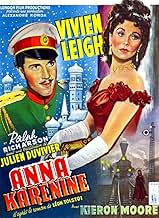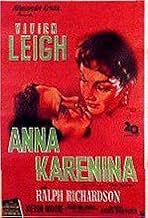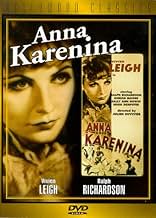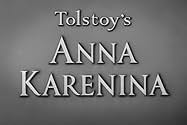IMDb-BEWERTUNG
6,6/10
3108
IHRE BEWERTUNG
Füge eine Handlung in deiner Sprache hinzuA married woman's affair with a dashing young officer has tragic results.A married woman's affair with a dashing young officer has tragic results.A married woman's affair with a dashing young officer has tragic results.
Niall MacGinnis
- Levin
- (as Niall Macginnis)
Empfohlene Bewertungen
I've now watched 6 Anna Kareninas (1935, 1947, 1961, 1985, 1997 and 2012) and this is up there as one of the top ones. Vivien Leigh is perfectly cast as Anna Karenina. There's just something about Leigh that suggests strength but also fragility, primness but also sensuality. She is totally believable as a sensible woman who would go silly over an affair, and believable as a fertile motherly type, frequently surrounded by children.
The object of the affair is the film's weak link- and it's a big one. Keiron Moore as the dashing Count Vronsky seems about as worldly as Anna's little son Sergei. You can sense Vivien Leigh trying to coax him into displaying some sort of dominant passion but Moore is hopelessly lost. His natural accent is Irish I think; his English accent sounds hopelessly strangled.
Ralph Richardson as Anna's bureaucratic husband Karenin is a bit too strong. He has the dominance that Vronsky should have and he displays his love for Anna too clearly. Anna is partly driven to her affair by Karenin's coldness so it makes the affair less credible. Their relationship is too loving- it often seems that there will be a reconciliation, as Leigh clearly has more chemistry with him than Moore.
Onto the supporting actors now. The Kitty/Levin story, although very pared down, is sweet and touching. Yes, they miss out all of Levin's philosophy and farming, but Sally Ann Howes is adorable as Princess Kitty, who gentleman farmer Levin hopelessly loves. It is also neatly tied together with the Anna story when Karenin goes along to their wedding- without Anna.
The film might seem a little dated but I enjoyed the focus on Karenin. There's a comic scene where Karenin goes along to a solicitors to ask about divorce and the solicitor seems a little voyeuristic. Where do I place it in the six AK films? I'm tempted to put it at number 2, just behind the Garbo one.
The object of the affair is the film's weak link- and it's a big one. Keiron Moore as the dashing Count Vronsky seems about as worldly as Anna's little son Sergei. You can sense Vivien Leigh trying to coax him into displaying some sort of dominant passion but Moore is hopelessly lost. His natural accent is Irish I think; his English accent sounds hopelessly strangled.
Ralph Richardson as Anna's bureaucratic husband Karenin is a bit too strong. He has the dominance that Vronsky should have and he displays his love for Anna too clearly. Anna is partly driven to her affair by Karenin's coldness so it makes the affair less credible. Their relationship is too loving- it often seems that there will be a reconciliation, as Leigh clearly has more chemistry with him than Moore.
Onto the supporting actors now. The Kitty/Levin story, although very pared down, is sweet and touching. Yes, they miss out all of Levin's philosophy and farming, but Sally Ann Howes is adorable as Princess Kitty, who gentleman farmer Levin hopelessly loves. It is also neatly tied together with the Anna story when Karenin goes along to their wedding- without Anna.
The film might seem a little dated but I enjoyed the focus on Karenin. There's a comic scene where Karenin goes along to a solicitors to ask about divorce and the solicitor seems a little voyeuristic. Where do I place it in the six AK films? I'm tempted to put it at number 2, just behind the Garbo one.
First off, let us concede that neither the 1935 Greta Garbo "Anna Karenina" nor the 1948 Vivian Leigh version comes close to capturing the complexities of Tolstoy's masterpiece. Most significantly, Konstantin Levin and Kitty's relationship, and more particularly, Levin's protracted personal and metaphysical development, are dropped entirely, both screenplays preferring to treat the story as an adulterous romantic triangle with snowflakes instead of palm trees.
That said, what we are left with in both films are masterpieces of film craftsmanship, where the triple triumphs of cinematography, art direction, and costume design are the real stars.
Which is not in any way to lessen the contributions of the cast, who in both instances, make the best of what they have to work with.
Garbo enchants in many of her individual scenes, particularly with Freddy Bartholomew and Maureen O'Sullivan, (as Kitty). Who can forget her advising Kitty to seize her fleeting youth, with its promise of a dream prince to emerge from the blue haze of the mountain top. Equally impressive, is her muted aversion to Alexei Karenin, (Basil Rathbone).
But she fails in her depiction of a fatal love for Count Vronsky (Frederic March). Garbo, with her solemn, majestic and singular self possession--her "Queen Christina" like cerebral detachment, is simply too thoughtful, too deliberate, to in any way convey Tolstoy's impulsive, febrile and thoughtless anti-heroine.
True, she had forsaken all for John Gilbert in "Christina," but that decision was the result of deep and thorough soul searching, and explained with the eloquence of Solomon to her courtiers. In "Camille" she is by profession a lover, and so her ultimate renunciation of Armand, reveals the true depth of her character. But one cannot conceive of her destroying the lives of others to satisfy a whimsical infatuation.
And this is where Miss Leigh's Anna trumps Garbo, for Miss Leigh does successfully transmit Anna's neurasthenic and utterly reckless collapse at the feet of the dashing Count. She seems blown by forces much stronger than she--a daffodil in a windstorm, and light years from Garbo's deep Scandanavian imperturbability.
Given the alleged similarities between Miss Leigh and Anna's disposition, perhaps this is life imitating art. In any case, it is why she makes a truer Anna, and why the role serves as a warm up for Blanche Dubois...
She is also abetted in her interpretation, by the genuinely eerie, recurring, nightmare sequence--with the Charon like, white bearded old man, forever dogging her as he chinks away at the ice. An ill omen indeed ! And Miss Leigh conveys the desperation of her impending doom in every gesture and nuance.
Then too Keiron Moore, (despite being an inferior actor to Frederic March) is much more dashing and handsome as Vronsky--a fact which, at least in terms of audience sympathy, helps explain the attraction.
Strangely, Mr. March who had been so visually appealing as Dr. Jeckyll, just a few years earlier, photographs very poorly in the Garbo version, and is not helped by a buzz haircut.
And as superb as Cedric Gibbons sets and Adrian's costumes are as a backdrop for Garbo, we feel Mr.Andrejew's art direction and Cecil Beaton's designs get the nod here as well, if only perhaps in their European origin, and the deep, appropriately moody nineteenth century shadows with which they are lit and photographed.
However, as visually sumptuous cinematic recreations of a vanished aristocratic world--each version has much to savor, and should be taken in tandem.
That said, what we are left with in both films are masterpieces of film craftsmanship, where the triple triumphs of cinematography, art direction, and costume design are the real stars.
Which is not in any way to lessen the contributions of the cast, who in both instances, make the best of what they have to work with.
Garbo enchants in many of her individual scenes, particularly with Freddy Bartholomew and Maureen O'Sullivan, (as Kitty). Who can forget her advising Kitty to seize her fleeting youth, with its promise of a dream prince to emerge from the blue haze of the mountain top. Equally impressive, is her muted aversion to Alexei Karenin, (Basil Rathbone).
But she fails in her depiction of a fatal love for Count Vronsky (Frederic March). Garbo, with her solemn, majestic and singular self possession--her "Queen Christina" like cerebral detachment, is simply too thoughtful, too deliberate, to in any way convey Tolstoy's impulsive, febrile and thoughtless anti-heroine.
True, she had forsaken all for John Gilbert in "Christina," but that decision was the result of deep and thorough soul searching, and explained with the eloquence of Solomon to her courtiers. In "Camille" she is by profession a lover, and so her ultimate renunciation of Armand, reveals the true depth of her character. But one cannot conceive of her destroying the lives of others to satisfy a whimsical infatuation.
And this is where Miss Leigh's Anna trumps Garbo, for Miss Leigh does successfully transmit Anna's neurasthenic and utterly reckless collapse at the feet of the dashing Count. She seems blown by forces much stronger than she--a daffodil in a windstorm, and light years from Garbo's deep Scandanavian imperturbability.
Given the alleged similarities between Miss Leigh and Anna's disposition, perhaps this is life imitating art. In any case, it is why she makes a truer Anna, and why the role serves as a warm up for Blanche Dubois...
She is also abetted in her interpretation, by the genuinely eerie, recurring, nightmare sequence--with the Charon like, white bearded old man, forever dogging her as he chinks away at the ice. An ill omen indeed ! And Miss Leigh conveys the desperation of her impending doom in every gesture and nuance.
Then too Keiron Moore, (despite being an inferior actor to Frederic March) is much more dashing and handsome as Vronsky--a fact which, at least in terms of audience sympathy, helps explain the attraction.
Strangely, Mr. March who had been so visually appealing as Dr. Jeckyll, just a few years earlier, photographs very poorly in the Garbo version, and is not helped by a buzz haircut.
And as superb as Cedric Gibbons sets and Adrian's costumes are as a backdrop for Garbo, we feel Mr.Andrejew's art direction and Cecil Beaton's designs get the nod here as well, if only perhaps in their European origin, and the deep, appropriately moody nineteenth century shadows with which they are lit and photographed.
However, as visually sumptuous cinematic recreations of a vanished aristocratic world--each version has much to savor, and should be taken in tandem.
A married woman (Vivien Leigh)'s affair with a dashing young officer has tragic results.
I read the novel several years ago in all its glory, but apparently most of it failed to stick with me because watching this film felt like i was hearing the story for the first time. And with there being so many different versions of the story on film, I am surprised I had not seen one before. (Unless I forgot those, too!) This seems like it must be the definitive version. The elegance, the intrigue. This is what I picture the aristocracy to be like. I love that they engage in seances, because that is such an upper class thing to do in the late 1800s. And Vivien Leigh? The perfect casting for a lead.
I read the novel several years ago in all its glory, but apparently most of it failed to stick with me because watching this film felt like i was hearing the story for the first time. And with there being so many different versions of the story on film, I am surprised I had not seen one before. (Unless I forgot those, too!) This seems like it must be the definitive version. The elegance, the intrigue. This is what I picture the aristocracy to be like. I love that they engage in seances, because that is such an upper class thing to do in the late 1800s. And Vivien Leigh? The perfect casting for a lead.
How can one possibly turn Tolstoy's novel into a "short" film? Even at 139 minutes in the uncut Korda version so much must be lost. What we end up, sad to say, is a first-rate melodrama without the psychological subtleties of the book. But that's the bad news. On the plus side, we have the sort of lavish the sky's-the-limit big, big, bigger budget production that only the Hungarian Alex Korda could have produced a few years after the world war on the sound stages of London --sets by the Russian Andreiev, costumes by the English Cecil Beaton; deep-focus photography and lighting by the French Henri Alekan ("Belle et Bete"), and music by the English composer Constant Lambert. Technically, this film contains some of the best B&W work ever done in Britian. Perhaps the greatest fault of the film is in the style of the acting. Vivian Leigh is a great beauty, very aristocratic, very British in her reserve, but when she falls in love with Vronsky she seems constitutionally incapable of the unbridled passion that Garbo brings to the role. Ralph Richardson, however, is perfect --far superior to Basil Rathbone. Richardson displays all the rigidity of Anna's husband; his enormous pride and wounded vanity; his total incapacity to understand his wife's heart. Needless to say, Kieron Moore as Vronsky tries very hard, looks wonderful in costumes, but he seems more a West-End juvenile than the great aristocrat and officer that Tolstoy depicts. Laurence Olivier would have been a perfect Vronsky. Why Korda chose not to cast him beside his wife is a mystery.
There is very little to find fault with in this screen update of Tolstoy's classic story. Vivien Leigh is near perfection as the main character. What makes this film work is the way our tragic heroine is shown in relation to the elements that surround her: the scenes of train journeys in winter to and from Russia; and the warm weather and grandeur of a summer spent in Venice.
The supporting players are very effective and match Miss Leigh's talents in the most important scenes. The moment where Anna breaks in to see her son who has been told she died should not be missed. But the single greatest aspect of this film is the inner journey this character takes, as envisioned by Tolstoy. It is a harrowing confrontation of one's fate and delivered bravely as only this classic actress can.
The supporting players are very effective and match Miss Leigh's talents in the most important scenes. The moment where Anna breaks in to see her son who has been told she died should not be missed. But the single greatest aspect of this film is the inner journey this character takes, as envisioned by Tolstoy. It is a harrowing confrontation of one's fate and delivered bravely as only this classic actress can.
Wusstest du schon
- WissenswertesVivien Leigh's costumes were made in Paris by Barbara Karinska to Cecil Beaton's designs. She was in such pain wearing them that she even went to her doctor fearing she had broken her ribs. It was subsequently discovered that the dresser had been putting the corsets on upside down.
- Zitate
Anna Karenina: My dear Korsunsky, you know very well I never dance unless I can help it.
- Crazy CreditsClosing credits: "And the light by which she had been reading the book of life, blazed up suddenly, illuminating those pages that had been dark, then flickered, grew dim, and went out forever".
- Alternative VersionenU.S. release version runs approximately 112 minutes. This is the version issued by Fox DVD in 2007.
- VerbindungenFeatured in Vivien Leigh: Scarlett and Beyond (1990)
Top-Auswahl
Melde dich zum Bewerten an und greife auf die Watchlist für personalisierte Empfehlungen zu.
Details
- Erscheinungsdatum
- Herkunftsland
- Offizieller Standort
- Sprachen
- Auch bekannt als
- Alexander Korda's Production of Tolstoy's Anna Karenina
- Drehorte
- Monterey, Kalifornien, USA(racetrack and steeplechase scenes)
- Produktionsfirma
- Weitere beteiligte Unternehmen bei IMDbPro anzeigen
Box Office
- Budget
- 2.000.000 $ (geschätzt)
- Laufzeit
- 1 Std. 45 Min.(105 min)
- Farbe
- Seitenverhältnis
- 1.37 : 1
Zu dieser Seite beitragen
Bearbeitung vorschlagen oder fehlenden Inhalt hinzufügen






































